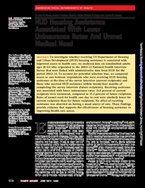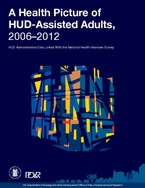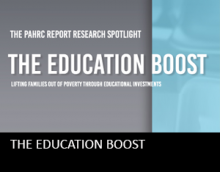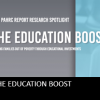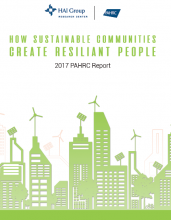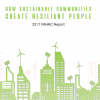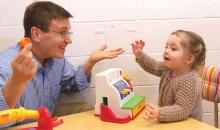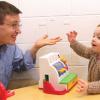0
Video
Community:
Jul 19, 2017
Authored by: CLPHA
Topics: CLPHA, Education, Housing, Midwest, Partnerships
 Shared by CLPHA Admin
Shared by CLPHA Admin
CLPHA Admin posted a
on Jul 19, 2017
Recorded at CLPHA's 2017 Affordable Housing & Education Summit on July 12, 2017.
How leadership in Akron, Ohio prioritized partnerships to improve educational outcomes for residents in public housing.
David James, Superintendent, Akron Public Schools, Akron, Ohio
Ilene Shapiro, Summit County Executive, Summit County, Ohio
Derran Wimer, Executive Director, Summit Education Initiative, Summit County, Ohio
Tony O’Leary, Moderator, Executive Director, Akron Metropolitan Housing Authority
0
Research
Community:
Jun 22, 2017
Alan E. Simon, Andrew Fenelon, Veronica Helms, Patricia C. Lloyd and Lauren M. Rossen, Health Affairs, 36, NO. 6 (June 2017): 1016–1023
Authored by:
Topics: Health, Medicaid / Medicare
 Shared by Steve Lucas
Shared by Steve Lucas
Steve Lucas posted a
on Jun 22, 2017
Abstract: "To investigate whether receiving US Department of Housing and Urban Development (HUD) housing assistance is associated with improved access to health care, we analyzed data on nondisabled adults ages 18–64 who responded to the 2004–12 National Health Interview Survey that were linked with administrative data from HUD for the period 2002–14.
Alan E. Simon, Andrew Fenelon, Veronica Helms, Patricia C. Lloyd and Lauren M. Rossen, Health Affairs, 36, NO. 6 (June 2017): 1016–1023
0
Research
Community:
Jun 22, 2017
Unprecedented descriptive analysis linking HUD administrative data and results from the National Health Interview Survey (pre-Affordable Care Act)
Authored by:
Topics: Affordable Care Act, Cost effectiveness, Dental, Depression, Exercise, Health, Healthy homes, Housing, Medicaid / Medicare, Mental health, Nutrition, Obesity, Research, Seniors, Smoke-free, Substance abuse
 Shared by Steve Lucas
Shared by Steve Lucas
Steve Lucas posted a
on Jun 22, 2017
From the Office of Policy Development and Research (PD&R) at the U.S. Department of Housing and Urban Development:
Unprecedented descriptive analysis linking HUD administrative data and results from the National Health Interview Survey (pre-Affordable Care Act)
0
Research
Community:
May 24, 2017
CSH reviewed more than 32 studies of supportive housing and compiled information about outcomes (housing, healthcare, and more). These reviews should be helpful for anyone looking to quantify particular impacts of housing. Please note that this review was not undertaken in an academic or systematic way; we make no claims about the strength of these evaluations or their findings.
Authored by: CSH
Topics: Health, Healthy homes, Homelessness, Housing, Supportive housing
 Shared by Steve Lucas
Shared by Steve Lucas
Steve Lucas posted a
on Jun 8, 2017
CSH reviewed more than 32 studies of supportive housing and compiled information about outcomes (housing, healthcare, and more). These reviews should be helpful for anyone looking to quantify particular impacts of housing.
0
Research
Community:
May 3, 2017
This article explores racial disparities between assisted housing outcomes of black and white and white households with children. We compare the assisted housing occupied by black and white households with children, and examine whether young adult education, employment, and earnings outcomes in 2011 differ between blacks and whites who spent part of their childhood in assisted housing in the 2000s. We use a special version of the Panel Study of Income Dynamics (PSID) that has been address-matched to federally assisted housing, and the PSID’s Transition to Adulthood supplement, along with geocode-matched data from the U.S. Census Bureau, American Community Survey (ACS), CoreLogic real estate data, and U.S. Department of Housing and Urban Development (HUD). Statistical methods include difference in means, logit and general linear models. We find no evidence of racial disparities in the type of assisted housing program, the physical quality of project-based developments, or the management of public housing developments in the 2000 decade. But black households with children are more likely to live in assisted housing that is located in poorer quality neighborhoods. Multivariate tests reveal that the worse outcomes of black young adults compared with whites disappear once socioeconomic differences are taken into account. The discrepancy in assisted housing neighborhood quality experienced by black and white children makes no additional contribution to predicting young adult outcomes. Nonetheless, black children living in relatively better assisted housing neighborhoods tend to have better outcomes in young adulthood than those who live in poorer quality assisted housing neighborhoods. We discuss sources of racial disparity in neighborhood quality, and the policies enacted and proposed to address it.
Authored by: Sandra J. Newman & C. Scott Holupka for HOUSING POLICY DEBATE JOURNAL
Topics: Housing, Low-income, Racial inequalities, Research
 Shared by Housing Is
Shared by Housing Is
Housing Is posted a
on Jun 8, 2017
Sandra J. Newman & C. Scott Holupka for HOUSING POLICY DEBATE JOURNAL
This article explores racial disparities between assisted housing outcomes of black and white and white households with children.
0
Research
Community:
Mar 1, 2017
Authored by: The Public and Affordable Housing Research Corporation (PAHRC)
Topics: Education, Housing, Low-income, Post-secondary, Research, Workforce development
 Shared by Keely Stater
Shared by Keely Stater
Keely Stater posted a
on Jun 6, 2017
The Public and Affordable Housing Research Corporation (PAHRC)
0
Research
Community:
Jun 2, 2017
How Sustainable Communities Create Resilient People
Authored by: Public and Affordable Housing Research Corporation (PAHRC)
Topics: Community development
 Shared by Keely Stater
Shared by Keely Stater
Keely Stater posted a
on Jun 6, 2017
Public and Affordable Housing Research Corporation (PAHRC)
How Sustainable Communities Create Resilient People
0
Video
Community:
May 19, 2017
Over the past decade, new research has revealed the link between early trauma and lifelong mental health issues. These discoveries have since revolutionized social work, healthcare, and early education. Policy changes enacted in response to our understanding of the biology of trauma are prioritizing earlier interventions like nurse home visiting services for at-risk families, and an increase in pre-kindergarten programs.
This short animation by Nadja Oertelt is part of The Atlantic’s Next America: Early Childhood project, which is supported by grants from the Annie E. Casey Foundation and the Heising-Simons Foundation.
Authored by: Nadja Oertelt for THE ATLANTIC
Topics: Child welfare, Cost effectiveness, Early childhood, Home visiting, Mental health, Research
 Shared by Abra Lyons-Warren
Shared by Abra Lyons-Warren
Abra Lyons-Warren posted a
on May 22, 2017
Nadja Oertelt for THE ATLANTIC
Over the past decade, new research has revealed the link between early trauma and lifelong mental health issues. These discoveries have since revolutionized social work, healthcare, and early education.
0
Video
Community:
Dec 8, 2016
What's it like being a first-generation college student? Unlike most of their peers, they can't rely on the experience of parents and family to help them register for classes, fill out financial aid forms, or quickly adjust to their new lives on campus. These are the stories of several first-generation college students and graduates, and this video explores their challenges, sources of support, and recommendations for policymakers. With a third of all incoming college freshmen being first-generation, telling their stories and informing stakeholders is more important than ever.
Authored by: AMERICAN YOUTH POLICY FORUM
Topics: Education, Post-secondary
 Shared by Abra Lyons-Warren
Shared by Abra Lyons-Warren
Abra Lyons-Warren posted a
on Feb 22, 2017
AMERICAN YOUTH POLICY FORUM
What's it like being a first-generation college student? Unlike most of their peers, they can't rely on the experience of parents and family to help them register for classes, fill out financial aid forms, or quickly adjust to their new lives on campus.
0
Video
Community:
Feb 14, 2017
If a homeless student is worrying about where he is spending the night, it’s likely he’s not going to be thinking much about his homework. And in one of the poorest districts in Kansas, educators have realized that to help homeless students they needed to do more to help homeless families. Special correspondent Lisa Stark of Education Week traveled to Kansas City to explore their unique program.
Authored by: Lisa Stark for PBS NEWSHOUR
Topics: Education, Homelessness, Midwest
 Shared by Abra Lyons-Warren
Shared by Abra Lyons-Warren
Abra Lyons-Warren posted a
on Feb 17, 2017
Lisa Stark for PBS NEWSHOUR
If a homeless student is worrying about where he is spending the night, it’s likely he’s not going to be thinking much about his homework. And in one of the poorest districts in Kansas, educators have realized that to help homeless students they needed to do more to help homeless families.
0
Research
Community:
Sep 1, 2014
Authored by: Greg J. Duncan and Katherine Magnuson for The Uninversity of Wisconsin-Madison Institute for Research on Poverty
Topics: Early childhood, Homelessness, Legislation & Policy, Low-income, School-readiness
 Shared by Amber-Lee Leslie
Shared by Amber-Lee Leslie
Amber-Lee Leslie posted a
on Jan 27, 2017
Greg J. Duncan and Katherine Magnuson for The Uninversity of Wisconsin-Madison Institute for Research on Poverty







